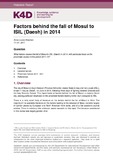| dc.contributor.author | Strachan, Louise Anna | |
| dc.date.accessioned | 2017-07-06T10:50:40Z | |
| dc.date.available | 2017-07-06T10:50:40Z | |
| dc.date.issued | 2017-01-17 | |
| dc.identifier.citation | Strachan, A.L. (2017). Factors behind the fall of Mosul to ISIL (Daesh) in 2014. K4D Helpdesk Report. Brighton, UK: Institute of Development Studies. | en |
| dc.identifier.uri | https://opendocs.ids.ac.uk/opendocs/handle/20.500.12413/13051 | |
| dc.description.abstract | The city of Mosul in Iraq’s Nineveh Province fell to the Islamic State in Iraq and the Levant (ISIL), known in Iraq as Daesh,1 on June 9 2014, following three days of fighting between jihadists and the Iraqi Security Forces. This report looks at factors behind the fall of Mosul, a majority Sunni city, placing particular emphasis on the proximate factors leading to the city’s conquest by ISIL. There is a fairly small body of literature on the factors behind the fall of Mosul in 2014. The majority of the available literature on the factors leading to the takeover of Mosul consists largely of opinion pieces by European and North American think tanks, and of a few academic journal articles. There is relatively little evidence-based research on this topic. The literature considered in this review was largely gender-blind. | en |
| dc.language.iso | en | en |
| dc.publisher | Institute of Development Studies | en |
| dc.relation.ispartofseries | K4D Helpdesk Report;033 | |
| dc.rights.uri | https://www.nationalarchives.gov.uk/doc/open-government-licence/version/3/ | en |
| dc.subject | Conflict | en |
| dc.subject | Governance | en |
| dc.subject | Politics and Power | en |
| dc.subject | Security and Conflict | en |
| dc.title | Factors Behind the Fall of Mosul to ISIL (Daesh) in 2014 | en |
| dc.type | Helpdesk | en |
| dc.rights.holder | DFID | en |
| dcterms.dateAccepted | 2017-01-17 | |
| rioxxterms.funder | Default funder | en |
| rioxxterms.identifier.project | K4D | en |
| rioxxterms.version | AO | en |
| rioxxterms.funder.project | 9ce4e4dc-26e9-4d78-96e9-15e4dcac0642 | en |

